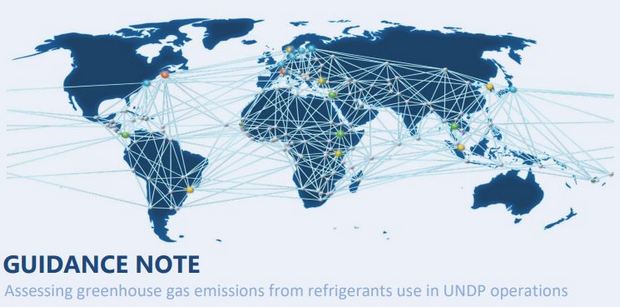Managing the carbon footprint related to leakage of refrigerants

UNDP upgrades methodology on assessing GHG emissions from refrigerants.
As global temperatures rise, the need for cooled spaces and refrigeration also increases. A study published in “Annual Reviews” in 2021 shows that greenhouse gas (GHG) emissions associated with space cooling and refrigeration amount to approximately 4,400 million tonnes of CO2eq, corresponding to over 10% of worldwide GHG emissions.
Yet sales of refrigeration and air conditioning (RAC) equipment continue to grow, exacerbating the pace of climate change even further.
The ‘cooling’ demand in UNDP offices, warehouses and vehicles is no exception. UNDP’s Montreal Protocol and Chemicals and Waste Management Unit (MPU) provides technical support and guidance to countries in meeting their obligations under the Montreal Protocol and UNDP is leveraging its technical expertise to calculate, manage, monitor and minimize its carbon footprint from refrigerant use more effectively.
The “GUIDANCE NOTE: Assessing greenhouse gas emissions from refrigerants use in UNDP operations” is now available to help UNDP offices to more accurately assess direct emissions of refrigerants from RAC appliances and vehicles in its operations and provides a step-by-step guide to relevant UNDP staff on how to apply this methodology. The methodology discussed in the Guidance Note has been tested by 11 offices from across UNDP – taking on this additional task for the greater good! – and has proven successful.
The document has been developed by the UNDP MPU with support from the UNDP Greening Moonshot team and independent RAC expert Mads Giltrup. This improved accounting approach will incentivize offices to take measures for better procurement, maintenance, servicing, and disposal of cooling assets and ultimately reduce UNDP’s operational carbon footprint as committed under the Moonshot Initiative.
The Guidance Note can also be useful to operations/facility managers or carbon accounting experts outside of UNDP.
